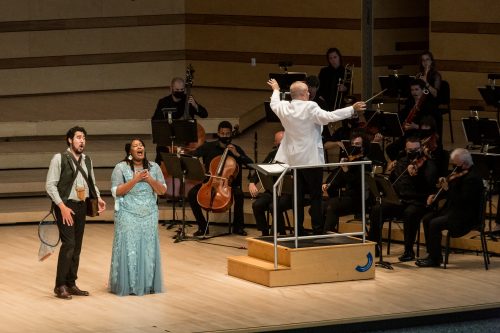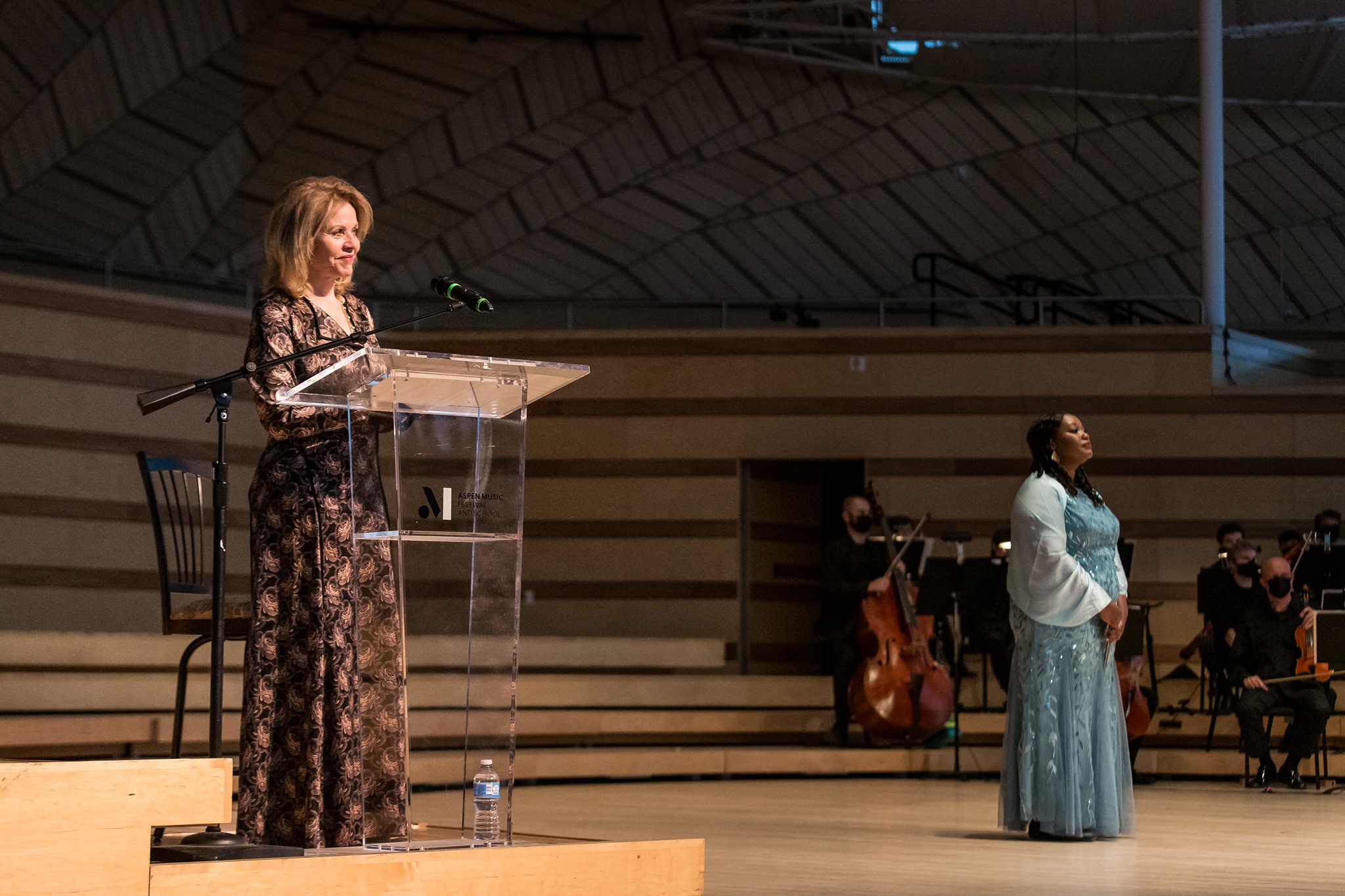 United States Aspen Music Festival [5]: Benedict Music Tent, Aspen, Colorado, 16-18.7.2021. (HS)
United States Aspen Music Festival [5]: Benedict Music Tent, Aspen, Colorado, 16-18.7.2021. (HS)

Program 13: Renée Fleming (soprano), Aspen Chamber Orchestra / Robert Spano (conductor), 16.7.2021.
Michael Abels – Dances and Delights
Maria Schneider – Winter Morning Walks
Brahms – Variations on a Theme by Haydn
Program 14: Mozart, The Magic Flute: Aspen Opera Theater / Patrick Summers (conductor), 17.7.2021.
Production:
Director – Edward Berkeley
Narrator – Renée Fleming
Cast:
Tamino – Anthony Ciaramitaro
Pamina – Amani Cole-Felder
Papageno – Ricardo José-Rivera
Queen of the Night – Sarah Vautour
Sarastro – William Guanbo Su
Speaker – Joshua Conyers
First Lady – Anne Wright
Second Lady – Erin Wagner
Third Lady – Lauren Decker
Papagena – Yvette Keong
Program 15: Yefim Bronfman (piano), Aspen Festival Orchestra / James Conlon (conductor), 18.7.2021.
Alvin Singleton – 56 Blows (Quis Custodiet Custodes?)
William L. Dawson – Negro Folk Symphony
Beethoven – Piano Concerto No.3 in C minor
The musical highlight of this past weekend at the Aspen Music Festival was Beethoven’s Piano Concerto No.3 with pianist Yefim Bronfman, a regular visitor to the Aspen Music Festival, and conductor James Conlon, whose baton has been absent from Aspen for ten years.
It would have been the most memorable thing from the weekend, except for the tragedy: Edward Berkeley’s death on Saturday. The longtime head of the festival’s opera theater and voice wing had been found unresponsive in his apartment shortly before the performance of Mozart’s The Magic Flute, for which he had stage-directed and written a witty narration.
The orchestra had tuned and the Benedict Music Tent audience was settling in when festival CEO Alan Fletcher, joined by music director Robert Spano and board chairman Alan Klein, relayed the news to a stunned audience. The brain trust agreed that Berkeley would want the show to go on, and they dedicated the performance to the much-loved Berkeley’s memory. After a moment of silence, and a brief break for the cast to catch a breath after hearing the news only minutes before, conductor Patrick Summers gave the downbeat and a slimmed-down orchestra launched into the overture.

Covid protocols required the reduced instrumentation and, with no intermission, helped cut the running time in half. Berkeley’s narration replaced long recitatives and deleted the character of Monastatos, who is problematic in these days of race sensitivity. Gone were iconic scenes of music taming animals (and Monastatos’s gang). With no change for stage sets, the focus turned to the love stories and overlapping themes of humanity. Renée Fleming, who along with Summers now leads the festival’s voice program, read the concise narration which creatively sidestepped missing elements.
Given the circumstances, the cast came through well, if not quite flawlessly. Most impressive was the Papageno of Ricardo José-Rivera, whose comic timing matched his lyric baritone and good phrasing. Tenor Anthony Ciaramitaro, looking like a reincarnation of Richard Tucker, delivered ringing tenor notes as Tamino. Amani Cole-Felder’s lighter soprano caressed Pamina’s aria, and Sarah Vautour as the Queen of the Night had an imposing stage presence, and nailed nearly all of the treacherous high notes in her two arias.
Sopranos Anne Wright and Erin Wagner and mezzo-soprano Lauren Decker, all in evening gowns, doubled as the sinister three ladies and the helpful three boys.
For his part, Summers led a skillfully timed, well-coordinated performance. With the orchestra stationed stage left he was constantly conducting the singers over his left shoulder. It all worked, even if a few more string players might have created a better orchestral balance. Most notable was flutist Eyvatar Baruch, who stood up when Tamino was ‘playing’ his magic flute. No doubt that was an Ed Berkeley touch.
In Sunday’s Beethoven concerto, Conlon set an ideal pace and style, and Bronfman lavished magnificent technique on every phrase, every gesture, every trill, every reworking of a tune the orchestra had just played, making it even more magical. Details of the music came through clearly, no matter how impetuous the pace in the outer movements, or how dreamily and stately the soft chords of the Largo from the piano were embellished by impeccable playing by the woodwinds.
Sunday’s program also included a couple of works by Black Americans. Conlon opened with Alvin Singleton’s 56 Blows, an often-raucous 12-minute tone poem written in response to the 1991 beating of Rodney King by Los Angeles Police. The piece is tough going, with sharp blasts of brass and percussion and dense, often dissonant harmonies, but it makes its point.
Then, without pause, the conductor launched into William L. Dawson’s Negro Folk Symphony, debuted by the Philadelphia Orchestra under Leopold Stokowski in 1934. The 33-minute piece teems with fragments of songs the composer grew up with. It’s agreeable material, and Conlon introduced it by noting that Dawson wrote it as an answer to Dvořák’s New World Symphony. The melodies were often said to be from Indigenous American sources, but Dawson knew them to be from his culture. Although he wrapped these memories in soundly constructed compositional techniques, he never really let a melody roll out before developing it or moving on to another (a mistake Dvořák did not make in his symphony).
The weekend’s other extraordinary solo moment came Friday when Fleming channeled her familiarity with jazz into a stellar performance of Winter Morning Walks. Written by the estimable jazz bandleader and composer Maria Schneider, the song cycle proved to be an ideal vehicle for Fleming’s voice and style as the centerpiece of the Chamber Orchestra program.
Schneider wrote the songs in 2011 for the soprano Dawn Upshaw, inspired by a series of 100 short poems by former United States poet laureate Ted Kooser. Recovering from cancer treatments that kept him from daylight, Kooser took walks before dawn and sent daily poetic reflections via postcard to a friend. His distinctly American style – common words deftly arranged for lyric imagery – fits Schneider’s straightforward but sumptuously textured writing in a modern classical idiom of her own.
The nine songs liken a flashlight’s beam to the moon on a leash, a sunrise to a hunter’s cap; the drip of melting ice and finches clinging to a feeder are metaphors of the poet’s own tenacity. Fleming’s American directness, even as the melodic lines soared high or dipped below the staff, delivered the music so perfectly that the audience, even without projected titles that would have made every word clearer, rose instinctively to a big ovation.
Schneider’s music uses elements of jazz, especially plush harmonies that would be at home in a jazz ballad, and an unusually voiced trio of jazz artists – Dana Landry on piano, Gonzalo Teppa on bass and John Gunther on alto and bass clarinets. Vocal lines follow the arc of the words without following their rhythms too dutifully. Schneider uses the orchestra as a scene-setter and foundation for the voice, only occasionally opening up a section to a memorable orchestral interlude. One of those came in the final song, before Fleming repeated the last line: ‘This morning the sun stood right at the end of the road and waited for me’.
One can only hope that we won’t have to wait too long for Fleming to record these songs so we can savor them at will.
The concert opened with a fascinating 13-minute piece that is also infused with jazz elements. In his 2008 Dances and Delights, Michael Abels wrote out solo lines for a string quartet to emulate jazz improvisation. Violinists Bing Wang and Espen Lilleslåtten, violist Ben Ullery and cellist Desmond Hoebig articulated this music impressively.
Conductor Robert Spano got the orchestra to breathe some life into Abels’s piece, and accompanied Fleming well, but Brahms’s Variations on a Theme by Haydn, which concluded the program, breezed through the intricate variations with too little inflection to grab much interest.
Harvey Steiman
